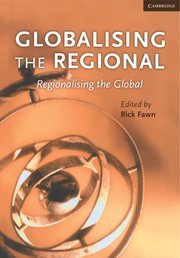‘Regions’ and their study: wherefrom, what for and whereto?
Published online by Cambridge University Press: 05 June 2012
Summary
Abstract. Long a focal point in the study of Geography, regions have become a major concern of International Relations, and for some even its essence. Principle definitions and approaches, however, remain contested, as do the contexts in which and how they matter, from economic to security. This article examines contested views on what constitutes a region and on the nature and functioning of regional architecture, drawing from thematic and case-specific literature to indicate the expanse of analytical enquiry. These include the roles and interpretations of geography, identity, culture, institutionalisation, and the role of actors, including a hegemon, major regional powers and others actors from within a region, both state and societal. A final section indicates additional areas for future research.
Introduction
Regions, regionalism and regionalisation matter. While globalisation secures much attention in the study of world politics, scholars of regionalism see regions as the fundamental, even driving force of world politics. One recent study asserts ‘one of the most widely noted and counter-intuitive features of the contemporary “global” era is that it has a distinctly regional flavour’. In policy terms, ‘almost every country in the world has chosen to meet the challenge of globalization in part through a regional response’.
Regions cut across every dimension of the study of world politics; for their proponents, they even constitute the study of International Relations (IR). While some will reject or downplay the importance of regions in world order, one major reader asserts that ‘The resurrection and redefinition of regionalism are among the dominating trends in today's international studies’.
- Type
- Chapter
- Information
- Globalising the Regional, Regionalising the Global , pp. 5 - 34Publisher: Cambridge University PressPrint publication year: 2009

